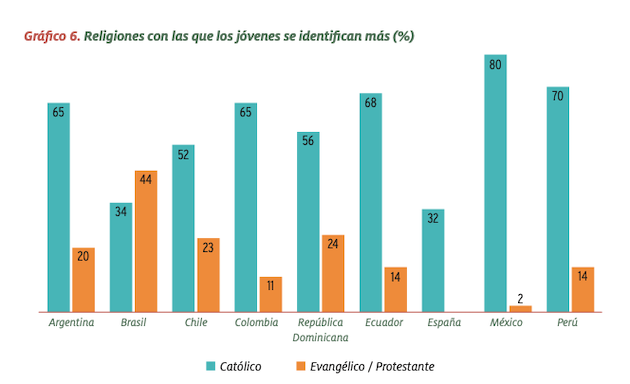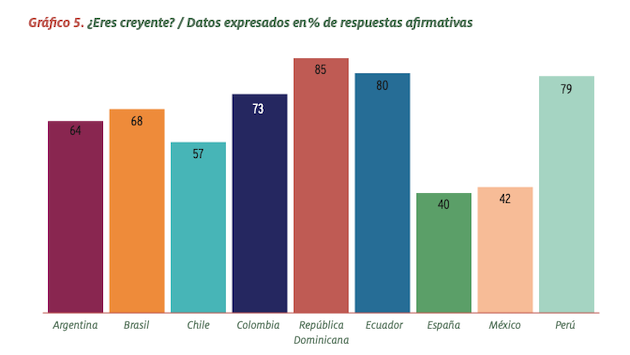Ibero-American youth: Family- oriented, educated and less religious
A survey identifies the interests, difficulties and hopes of young people, with religion playing a much less relevant role than in previous generations.
Protestante Digital · 22 JULY 2022 · 15:50 CET

According to a report by the SM Foundation, Ibero-American young people are turning to education and the family to face the present, in the midst of an uncertain future following the pandemic.
Young people in Ibero-America 2021 makes a comparative study of how young people are, think and behave in nine countries, through 13,500 interviews carried out during 2019 and 2020 in Mexico, Peru, Dominican Republic, Chile, Brazil, Argentina, Ecuador, Colombia and Spain.
The SM Foundation aims to summarise some of the trends of young people, identifying behaviours, their political and social views, their opinions on important issues, their use of free time and how they see religion.
Family and education
The study concludes that family and education play a key role in the present of young Ibero-Americans, "as the main points of reference to understand the world and face life".
"For over 90% of young people, family and education are vital priorities when it comes to shaping their ideas and interpretations of the world," explain the authors, who also highlight "health" and "the environment" as issues of greatest interest and concern.
Religion and politics, on the other hand, are the two issues that score lowest on average in terms of importance.

The strong rise of atheism
According to the report, among young people religion plays a "more diminished" role than in other sectors of the population, and in some countries it is even "in a clear process of dissolution".
Spain, Chile, Argentina and Mexico have increasingly low figures for religious practice, and in some of these countries more than half of young people identify themselves as atheists or agnostics.
The exception is Brazil, where religion still holds an important place for young people.
"In general terms, Ibero-American young people raised as Christians, especially those in Argentina and Chile, and with the exception of those in Brazil, are the ones who in greater proportion have ceased to be Christians as adults, something that especially affects Catholics (Pew Research Center, 13/11/2014)", the report states.
The authors highlight "the strong growth of atheism, which exceeds 60% in Spain, reaches 40% in Chile and 35% in Argentina and Mexico".
However, this lack of religiousness does not always mean atheism, as the option of "I have no religion, but I believe in God" exceeds 10% in several countries (Colombia, Dominican Republic and, above all, Chile, with almost 20% of young people).
The two major faiths are Protestant/Evangelical and Catholic.

How do they see themselves?
Ibero-American young people define themselves as "rebellious" as their main trait. Other relevant traits are the importance of personal image care, consumption and leisure.
Among the favourite leisure options, the most popular are those that take place in private spaces and audiovisual media, such as music, series, films, video games or interactions through social media.
"The most common activities for the majority are listening to music (59 %), watching television (56 %), meeting friends (48 %) and watching series (40 %)", says the report .
Young people "do not feel listened to by politicians, distrust institutions and are particularly critical of the quality of democracy in their own countries".
Respondents are also critical of how migrants are treated in their countries, prefer to live in diverse societies and say they are willing to migrate in the future in order to thrive.
"In Brazil, the Dominican Republic and Ecuador the main reason for moving is the lack of job opportunities and the search for them abroad", while "in Chile, Colombia and Spain the main reason is the search for better living conditions".
You can read the full report here (in Spanish),
Published in: Evangelical Focus - life & tech - Ibero-American youth: Family- oriented, educated and less religious
